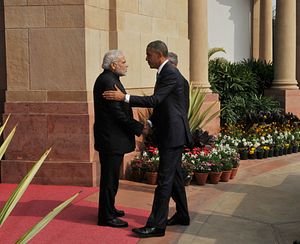Last year, when Indian Prime Minister Narendra Modi visited the United States in June, he left with an important concession on defense from the United States. The Obama administration declared that India would become the United States’ first ‘Major Defense Partner.’
The designation was bespoke for India and represented something between a traditional ally (a term that some in India remain allergic to, especially with respect to the United States) and a strategic partner. The designation in a way represented the apotheosis of bilateral defense progress that had been underway since Modi became prime minister in 2014 and the Defense Technology and Trade Initiative, an initiative from 2012, gained steam.
Per India’s designation as a U.S. ‘Major Defense Partner,’ it would have access to “a wide range of dual-use technologies” at “a level commensurate with that of [the United States’] closest allies and partners.” For New Delhi, this status was a big deal and signaled the arrival of the United States as a serious long-term defense cooperation partner on par with Russia. (Washington had seized Moscow’s position as India’s top source of defense imports recently as well.)
The transition to the Trump administration has introduced foreign policy ambiguities along several axes — not just with India, but with Asian states more broadly. Nevertheless, it appears that the Obama administration’s designation last year is seeing continuity.
Pentagon Spokesman Capt. Jeff Davis told the Press Trust of India that “The relationship between India and the United States is on track.” Specifically, he underlined U.S. Defense Secretary James Mattis’ commitment to the relationship.
Interestingly, on its final day in office, the Obama administration relaxed India-specific regulations on defense export controls, which partly started the process of implementing the new ‘Major Defense Partner’ status. According to PTI, “the Bureau of Industry and Security (BIS) amended the Export Administration Regulations (EAR) by establishing a licensing policy of general approval for exports or re-exports to or transfers within India of items subject to the EAR.”
“The changes in the Export Administration Regulations, reflective of India’s status as a Major Defense Partner, will enhance defense ties as well as private sector linkages,” an unnamed U.S. State Department official told PTI, adding that “India is the only country in the world authorised to receive both military and dual-use items under a [Validated End User] program.”
The continuity between administrations will augur well for U.S.-India ties this year, even with lingering concerns in New Delhi over the Trump administration’s plans for Afghanistan and Pakistan, and potential changes to U.S. immigration law.
The bilateral defense relationship continues to enjoy strong bipartisan support in the U.S. Congress as well.

































